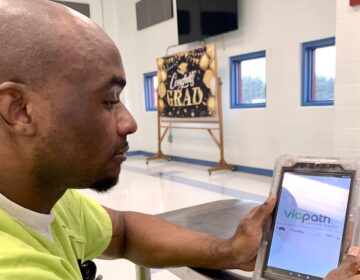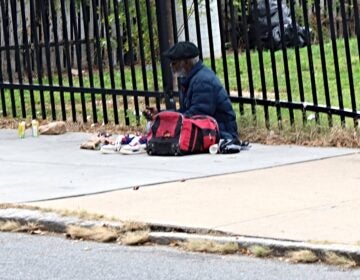‘Irreparable harm’: Delaware activists say legislation codifying certain crimes would make it harder for some to get bail
Some advocates argue a constitutional amendment and enabling legislation would make people with some felonies more likely to be held pretrial.
Listen 1:06
Legislative Hall in Dover, Delaware. (Johnny Perez-Gonzalez/WHYY)
From Philly and the Pa. suburbs to South Jersey and Delaware, what would you like WHYY News to cover? Let us know!
This story was supported by a statehouse coverage grant from the Corporation for Public Broadcasting.
Dover resident Crystal Chatman was arrested in 2023 on several felony gun charges, including possession of a firearm by a person prohibited from having one. Chatman got a $17,500 secured bail, meaning she had to give 10% of that to a bail bondsman in order to be released from custody. She didn’t have the money, so she stayed in prison.
Delaware lawmakers are on the verge of passing a constitutional amendment that would codify a list of felonies that would make a defendant “detention-eligible” for pretrial detention. The list is part of enabling legislation connected to the constitutional amendment that was signed last year by former Gov. John Carney. The bill is scheduled to be heard in the Senate Executive Committee on Wednesday.
Chatman said she was detained at the Baylor Women’s Correctional Institution in “inhuman conditions” for two days while her family struggled to raise the money for her release. Delaware is unique in that it does not have local jails, only state prisons.
“Toilets aren’t working, people aren’t able to call their families to let them know what’s going on,” she said. “The food that they have in the women’s prison, I wouldn’t feed to my dog.”
The list of felonies in the enabling legislation for the constitutional amendment includes violent offenses and “signal” crimes, such as first-degree murder, child abuse, selling drugs and possession of a firearm by a person prohibited. Signal crimes are defined as offenses that indicate a heightened risk to public safety.
If the constitutional amendment is approved, people like Chatman who are charged with possession of a firearm by a person prohibited could be automatically determined to be “detention-eligible” and held without being given the opportunity to post bail.
Detaining individuals for even fewer than three days causes irreparable harm, said Lisa Minutola, chief of legal services for the Office of Defense Services (ODS) in an emailed written response to a request for a phone interview. She said that harm can include the loss of employment, housing and transportation, increased familial strains, and exacerbation of mental health issues.
“While it may seem counterintuitive, pretrial detention can actually make communities less safe because these harms destabilize the individual, leading to an increased chance of recidivism,” Minutola said.
Tanya Whittle, director of policy at the Delaware Center for Justice, said she is concerned that the amendment codifies the ability for courts to hold people in preventative, pretrial detention without giving them access to bail.
“A lot of people feel that prosecutors already have too much power,” Whittle said. “Or police and prosecutors, depending on what they write something up as, what they charge it as and if we are codifying this list of crimes that, ‘Oh, if you’re charged with this, then the standard bail protocol doesn’t apply to you.’ That really is a concern.”
The list of charges and some of the language in the enabling legislation signed last year appear similar to a Special Rule of Criminal Procedure for Pretrial Release adopted by the courts in 2022.
Lawmakers began to overhaul the state’s bail system in 2018 with legislation sponsored by former Rep. J.J. Johnson. The bill required the creation of a pre-assessment tool that judges would use to determine the conditions of bail. It was part of an effort to move the state away from cash bail, where people who have the means can obtain freedom pretrial while poorer people languish in a prison cell.
“Just small amounts of money, like $200, that’s nothing to some folks,” Whittle said. “But it’s life and death to others.”
Senate Majority Leader Bryan Townsend is sponsoring the constitutional amendment and the enabling legislation. He said the bills aim to address the inherent inequity in which people’s freedom depends on their wealth.
A defendant can be released with no financial requirements, on an unsecured financial bond, on a secured financial bond or on a secured cash-only bond. The pre-assessment tool was to be developed to use data so judges could identify who is at the highest risk of either failure to appear or new criminal activity.
In 2022, the special procedure rule said judges can apply more “intensive conditions” for pretrial release for signal crimes and violent felonies, or if the court determines the defendant would be a substantial public safety or flight risk.
Townsend said having a charge on this list does not automatically mean that person is detained. But it’s important to codify the list, despite concerns about some of the offenses or even having a list.
“It gives guidance,” he said. “You don’t want a situation where very low-level offenders are detained pretrial, if there’s no basis for believing that they are a risk to the community? We’re trying to get away from that system.”
Chatman said she was later acquitted of the charges against her at trial. She is now a Smart Justice Ambassador with the American Civil Liberties Union of Delaware, along with Kevin Andrews, who was held 11 months pretrial in 1989 for a crime he says he was later also found not guilty of at trial. He said he stayed incarcerated because he could not afford to pay his bail.
“I lost being married in a relationship,” he said. “I lost the respect of my family, being accused of something that I didn’t do. I lost my job. I lost my place in my family, in my community.”
Chief Magistrate Alan Davis said the pre-assessment tool is being used by Delaware judges. However, he said after the state passed the 2018 legislation, data was being tracked to assess the health of the pretrial system, but much of it was hand-collected and unsustainable.
Davis said the data became skewed during the COVID-19 pandemic and that there’s a need to validate the risk assessment instrument at some point.
The fiscal note for the enabling legislation estimates the legislation will cost nearly $3.4 million in fiscal year 2026 that starts this July, and $4.4 million in fiscal year 2027. Much of that will go to an initiative that’s never happened in Delaware: public defenders being appointed to eligible defendants within 24 hours of arrest.
Minutola said in an email that the ODS has long advocated for the inclusion of resources to provide representation at the Justice of the Peace Court level. They are the first to see someone who is arrested by police and set bail conditions.
“Having an attorney at a client’s side at a bail hearing can decrease the use of monetary bail and pretrial detention while increasing their opportunity for pretrial release by amplifying the client’s voice and expertly advocating for them in ways they cannot on their own,” she said.
Constitutional amendments must pass both chambers in two consecutive sessions to change Delaware’s constitution. The bill passed the General Assembly last year, so it’s on its final leg.
Townsend said he’s confident it will pass again this year. Minutola expressed support for the amendment, as did Delaware Attorney General Kathy Jennings. But Whittle is concerned about enshrining charges like Chatman’s into law.
“The political will is never there to reduce the list,” she said. “It’s only going to grow.”
WHYY is your source for fact-based, in-depth journalism and information. As a nonprofit organization, we rely on financial support from readers like you. Please give today.








